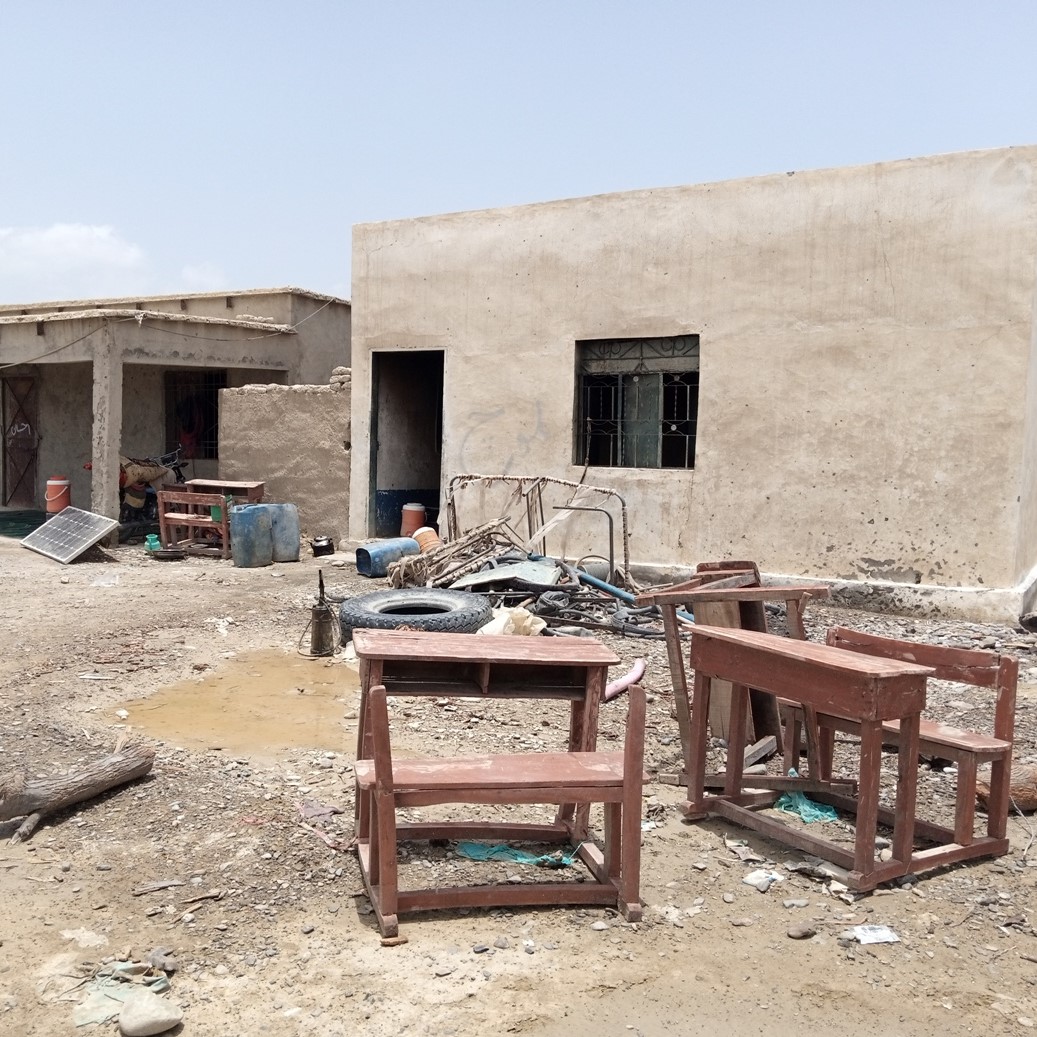Eleven-year-old Abid was a second-grade student three years ago, but he is now out of school and spends his time grazing sheep.
Abid lives in the Musa Goth village in Jhau Tehsil, located in the Awaran district of Balochistan. In the past, Abid and his two elder siblings attended a nearby community school, which shut down in 2019. Abid’s brother works as a driver, whereas his sister manages the household.
His school was located in the nearby village of Bakar Sarmastani Goth. The school’s building is now being used by a construction company that has converted one room into a store and the other into a kitchen. Once used by the students, desks and benches in the building now deteriorate in the open air.
Nadir Ali from Musa Goth and Dil Murad from Bakar Sarmastani Goth used to teach in this school until the construction company took control over it three years ago.
They say that students from the nearby villages of Kalkuri, Gharibabad, Pirdan, Saleh Bizenjo Goth, Chakar Goth, Mosul Pir and Mamo Goth also came to study in this school. Among the 56 students in total, the majority were girls. Due to the school’s closure, all these children have been deprived of their education.
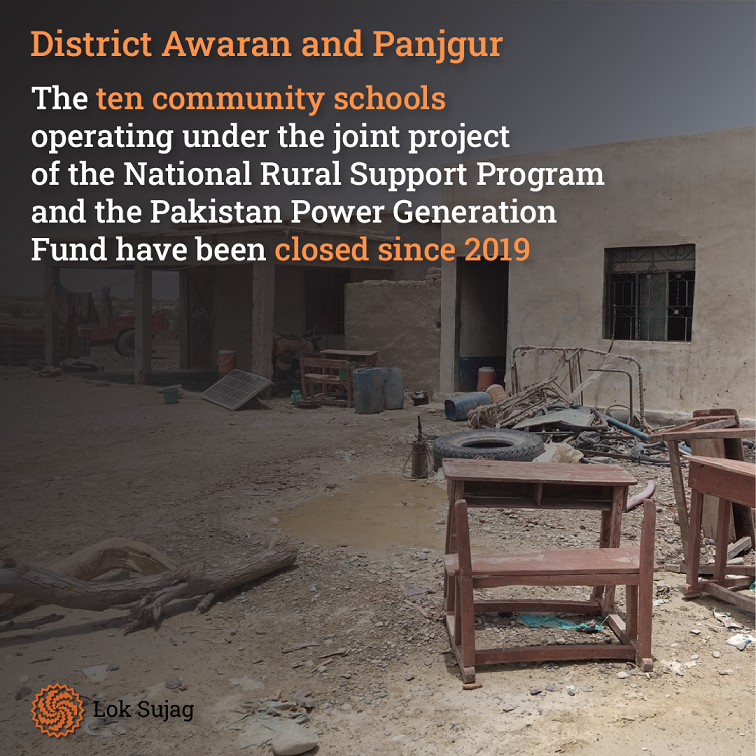
The National Rural Support Program (NRSP) and Pakistan Poverty Alleviation Fund (PPAF) jointly established this school in Bakar Sarmastani Goth in 2010.
As part of this collaborative effort, the project established ten community schools in Awaran and Panjgur districts of Balochistan. This project opened seven schools in the Srimachi, Lal Bazar, Sarmastani Goth, Musa Bazar, Sastagan, Gaddor Goth, and Muruki areas of Awaran district.
According to Saeed Alam, the senior program officer at the NRSP regional office in the Kech district, the community schools project ended in 2015.
The same year, the PPAF initiated the ‘Poverty Reduction Program’, which included an education promotion initiative. As part of this project, social enterprise schools were established, including all seven community schools in Awaran, ensuring their operation until 2019.
Saeed Alam explains that the model for this project was taken from Bangladesh. Under this model, teachers were trained to run the schools independently, but they could not, resulting in the schools being closed after completing the initial four-year term.
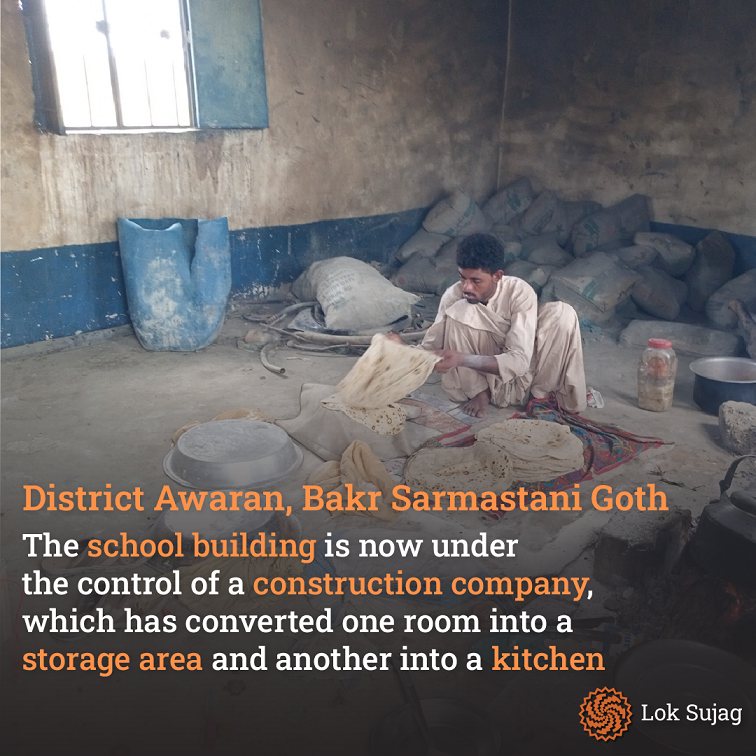
Abdul Ghani Mirwani, the Program Officer of NRSP in Awaran, states that before the termination of the project in February 2019, he had a meeting with Masood Haleem, the District Education Officer of Awaran, along with other officials from the organisation. During the meeting, they informed him in writing that the educational project was ending and requested the Education Department to take responsibility for these schools. However, they were unable to do so.
Regarding this, Masood Haleem says that the NRSP team did approach him but only provided a letter referring to the Education Department for the handover request of the school. However, the Education Department only takes responsibility with written instructions from authorised officials.
According to NRSP, 364 students were enrolled in the seven community schools, out of which 198 were girls. Additionally, 446 male and female students were enrolled in the nine social enterprise schools.
Mohammad Islam, a teacher from the now-closed school in Gaddor Goth, explains that local individuals were also included in the administrative team of these schools. If any teacher remained absent, they would be dismissed based on people’s complaints, and another teacher would be hired. Each teacher received a monthly salary of 15,000 rupees. Additionally, arrangements were made under this project to train the teachers.
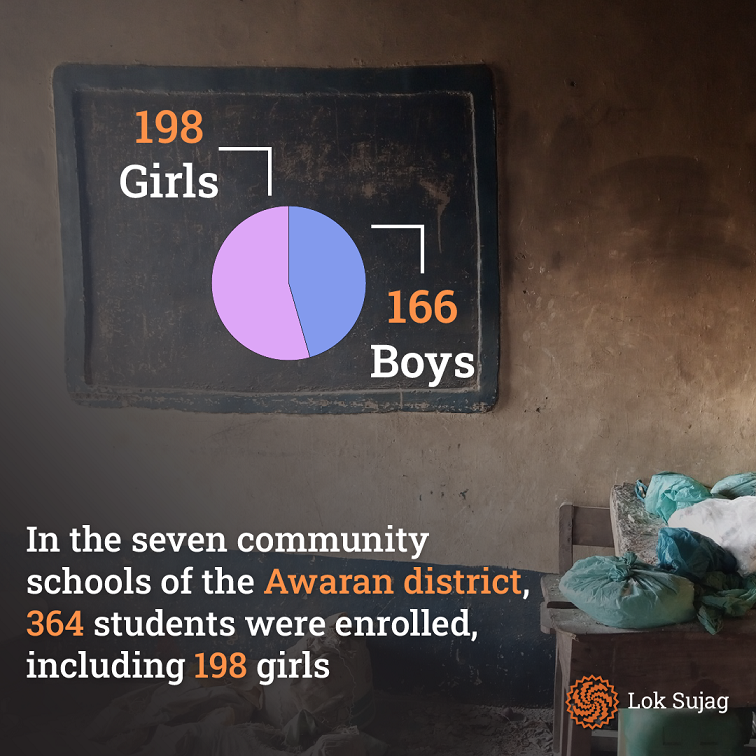
According to Islam, in the school of Gaddor Goth, 50 boys and girls were enrolled in primary education, and only seven of them had the opportunity to complete their primary education.
Hanif from the neighbouring village of Shahi Terip also used to study in the same school that closed down. Unfortunately, he couldn’t find further educational opportunities, and now works as a labourer. He mentions that one day their teachers received verbal notification from NRSP that the funds had been exhausted, and the local people would take over the responsibility of running the school. However, the local community expressed their inability to assume this responsibility.
Alam says they were running 20 Balochistan Education Foundation (BEF) schools before implementing community schools. In 2016, these schools were handed over to BEF. These schools are still operational because BEF had a contract with the Government of Balochistan to run them. However, he has yet to see any written agreement from the PPAF.
Ehsanullah Baig, the Program Manager for Education at the Poverty Elevation Fund, reveals that they ran community schools and assisted government schools in slums and other areas. This project was affected in 2019 when the COVID-19 pandemic emerged. The partner organisation NRSP had planned to hand over the schools to Local Support Organizations (LSOs) for operation after the end of the project period. However, it is unknown why they were unable to execute this plan.
Also Read
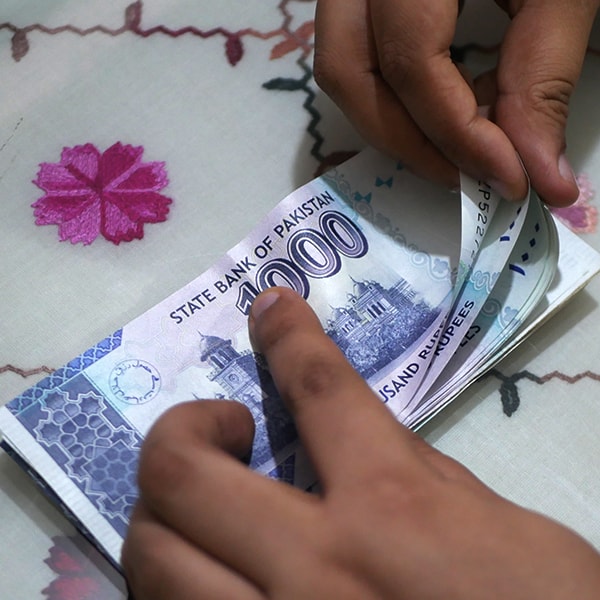
The rising cost of university education: 'The fee structure should not deny equal opportunities to poor students'
NRSP prepared the framework of Local Support Organisations (LSOs). Its purpose was to enhance the capabilities of local organisations and empower them to stand on their own feet, making them capable of managing schools effectively.
The LSO, established in Wajah Bagh, Jhal Jhao in 2010, managed six community schools and four social enterprise schools. Gohar Asad Imrani, the representative of this organisation, explains that when the school projects ended, the local community did not have the means to continue running them. Internal conflicts also caused damage to the LSO, leading to the closure of the schools.
A social enterprise school was also established in Saleh Buznjo Abad, six kilometres from Musa Goth. Five girls from Mohammad Hassan’s family in that village used to study in these schools, but they have now been deprived of education.
Hassan states that 37 male and female students were enrolled in this school. The termination of this project has particularly affected girls’ education. While boys could travel five kilometres on motorcycles to Government Boys’ High School in Langar, girls did not have access to such facilities, resulting in the loss of their educational future.
Published on 12 Jul 2023
